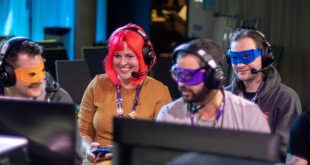[This is a guest post from Jenny McKearney, Technical Partnership Manager at XLOC, a Keywords Studio.
As the “world’s first cross-platform hunting action RPG”, Dauntless has achieved extensive reach – with an estimated 25 million players worldwide. It is among the most far-reaching free-to-play video games today.
Creating a homogenous player experience in eight languages, and even more regions, is a massive undertaking for any video game.
Yet, in every market—stretching across France, Germany, Japan, Italy, Russia and more—reception to Dauntless has been hugely positive, in part because the game undergoes a vigorous localization process.
According to the Co-Founder and CEO of Phoenix Labs, Jesse Houston: “We established Phoenix Labs to bring players together worldwide, regardless of device, location, or language. That’s why it was essential for us to launch Dauntless on all platforms with multiple supported languages – global parity is sacred to us.”
It begs the question: how can developers best ensure a seamless, top-tier experience for players across the globe?
Creating consistent levels of localization quality
For developers at Phoenix Labs, the goal was to achieve total parity across localised languages, to the point that each player feels as though the game has been made in their language natively.
Senior Producer on Dauntless, Mickaël Bohin, explains that over the past year they have moved from crowdsourcing translation to working with Keywords Studio’s XLOC – a content management system (CMS) for streamlining game localization workflow and managing the asset pipeline.
“It makes life a lot easier to have all content, iterations and discussions in the same place for all languages – whether that’s in-game content or marketing assets, talking with the translator or talking with the project manager.”
Rather than simply translating packaging, in-game text or dubbing, XLOC helped facilitate the effective deployment of a full localization process that considers cultural, political, religious and historical differences between languages, countries and regions. An almighty task – especially during a global pandemic.
Despite lockdown turning the rest of the world upside down, Bohin stresses that having one central studio and one dedicated CMS has allowed them to deliver Dauntless content on schedule, even as the game evolves with regular updates.
Communicating over every nuance
Being in permanent communication on the project—with translators, developers, publishers, vendor companies and LQA—has enabled Phoenix Labs to smooth out queries in real time, ensuring that the sentiment and colloquialisms of the games are localised and culturalised rather than simply translated for each language.
While translation simply converts text, localization transforms the entire product from one language to another. It covers both linguistic and cultural adaptation.
Localization has therefore become a vital part of the ever-growing global games market as, during the course of the pandemic, video games have been one of the most popular ways of connecting people locally and internationally.
With a game like Dauntless, which allows players to customize every aspect of their appearance and make changes wherever they want, it’s integral to ensure that the audio experience is specific to any given player’s language and culture.
While most strings take only a matter of days to create, certain vocabulary can be much tougher. For example, how do you translate the word ‘weapons’, and convey its use across all languages? And persuade a player to try it?
All of these situations necessitate continuous discussion. Think about it: Development is not static and sequential.
Anyone who works in a development studio will understand that the creative process is fluid and ever-changing, with many tweaks applied to strings before they are considered final. Discussions need to be happening constantly, and with as many visual aids as possible, across multiple time zones.
Whether you choose to create a proprietary technology, or use third-party software like XLOC, an all-in-one communication tool can eliminate some of the most prominent pain points of game localization.
Especially in a time of working from home, having a single source of information for all stakeholders saves time and helps create a consistent tone across all Dauntless assets.
Maintaining a central repository of assets
For accurate localization of a multi-market game like Dauntless, translation teams will also require clear knowledge of the type of source files and what information is contained in these files.
Having a central repository for all languages helps efficiently coordinate daily operations. Bohin summed up the benefits of a central repository.
“It’s a lot easier for daily operations and daily communication with all the stakeholders involved,” he explains.
Storing all assets—art, scripts, audio and beyond—in one centralised repository has made the production infinitely more efficient on Dauntless, even with developers working from home. With everything under one roof, XLOC keeps localization organised and easily accessible.
It’s also much easier to upload text files to a build. For Bohin, “running a super tight ship with XLOC allows us to keep our player base together and ensure that everyone has a top-tier Dauntless experience”.
As Dauntless is cross-play on every platform, from current to next gen, it’s all the more important to unite the player base and keep content consistent in this way.
Achieving global oversight
What Dauntless demonstrates with its multi-market success is the need for clear communication and oversight in game localisation.
As we embrace next generation consoles and ever-increasing data demands, tracking assets closely through the localization workflow is a must. This is especially true when, more and more often, we see games being localised with thousands of strings, very aggressive timelines and complicated conversation structures.
A central management system such as XLOC allows developers to work on multiple source languages in an automated and synchronized way, as seen in production for Dauntless which shipped in English, French, Russian, Japanese, Italian, Brazilian, Portuguese, Spanish and German.
With three billion people expected to be gaming by 2023, game publishers hoping to grow their market share need to broaden their horizons, and ensure that the localization and audio features of their games marries up to the highly customized player options they boast, in order to truly create a polished experience.

 MCV/DEVELOP News, events, research and jobs from the games industry
MCV/DEVELOP News, events, research and jobs from the games industry




